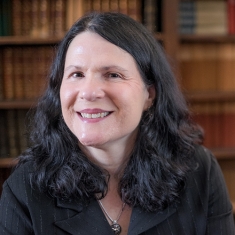Philosophy

Among the benefits of studying philosophy are the well-crafted tools it offers for approaching questions that we as human beings inevitably face: What is happiness, and can we hope to attain it? How do we balance our desires, needs and rights with those of other people and animals, now and in the future? Is there a God? Do people the world over think the same way about basic issues, or are there fundamental differences among cultures? If there are differences, must we respect them? At Smith, philosophy students learn to think with clarity, objectivity and precision; to become more skillful writers adept at expressing difficult concepts; to express themselves clearly in discussions; and to recognize and analyze the philosophical issues that arise in their other classes.
Announcements
Listen to podcasts created by Smith Philosophy students
Students in the spring 2022 course PHI 252 Buddhist Philosophy: Madyamaka and Yogācāra explored the applications of Buddhist philosophy outside of the classroom. They created a series of podcasts to showcase their findings which is accessible at their website Buddhist Philosophy and Buddhist Practice in the Pioneer Valley.
Interview with Theresa Helke
Theresa Helke, Smith graduate and recent lecturer in the Philosophy department, was interveiwed by Project Vox for their blog series, Revealing Voices. Project Vox concerns an important scholarly development in philosophy: the acknowledgement that a number of early modern women have been unjustly ignored in our narratives of the history of philosophy.
We encourage our students to read philosophical texts from an array of traditions, historical periods and genres, closely and critically, in order to develop an awareness of complexity and nuance, and we wish them to use those texts, orally and in writing, as sites for their own critical thinking, moral and intellectual exploration, and engagement with the world in which they live.
Accordingly, students who complete the major in philosophy should be able to:
- Understand and be familiar with major movements, authors, and philosophical traditions across the world.
- Understand philosophy in relation to historical frameworks, both diachronic (contemporary texts in relation to prior texts) and synchronic (texts in their own time, in relation to the contexts that shape an era’s thought and expression).
- Write clear, forceful interpretive arguments, which give voice to a complex understanding of philosophical texts, and marshal evidence carefully and persuasively.
- Conduct scholarly research in print and electronic formats, citing sources accurately and responsibly—and using that research to enter the critical debates and conversations that texts provoke.
- Make effective use of oral communication and presentation techniques.
Here is a small but representative sample of the kinds of questions raised in Smith philosophy classes which help students to achieve these goals:
- What does it mean to be a cosmopolitan person—a global citizen?
- In the United States and some other countries the gap between the super rich and everyone else has been growing in recent decades. Does this matter? Why (not)?
- Which (if any) of your behaviors can be explained by appeal to biology?
- What is the fundamental nature of reality? Is there one? Why should we care?
- Does privacy matter only if you “have something to hide”?
- A prison's warden has asked that you, a physician, participate in the execution of a death row prisoner by lethal injection. You are aware that the American Medical Association’s ethical guidelines prohibit doctors’ involvement in executions. You also know that if you decline to participate, the prisoner is at risk of greater suffering. What do you decide, and why?
Advisers: Members of the department
Study Abroad Adviser: Jay Garfield
Ten semester courses
1. At least two courses in the history of philosophy, one of which must be PHI 124 or PHI 125
2. A least one course addressing non-Western philosophy
3. PHI 101 or PHI 102
4. PHI 200, usually taken in the sophomore year
5. Two 300-level courses
6. Three 200-level courses (other than PHI 200), each from a different one of the following areas:
Value Theory
Including: PHI 221, 222, 233, 238, 241, 242, 255
Social/Political Philosophy
Including: PHI 225, 231, 235, 237fn, 240, 242
Culture and Material Life
Including: PHI 221, 233, 234ds, 240, 241, 254, 255
Metaphysics and Epistemology
Including: PHI 209, 211sr, 213, 225, 232ss, 234ts, 252, 254, 262
Language and Logic
Including: PHI 213, 220, 236, 262
Science and Technology
Including: PHI 209, 211pn, 211sr, 224, 238
Note
- Topics courses may fall under different rubrics in different years
- Up to two courses in related departments may be included in the major program of ten courses with approval of the department; petitions for approval must be filed with the department at least one week before the beginning of the semester in which the course is offered
Students and their faculty advisers together will regularly assess the student’s progress in the major in light of the following desiderata:
- Skills and competencies: e.g., PHI 102, PHI 200, the ability to write papers of varying lengths (from 2 to 25 pages to honors theses), knowing how to locate and assess scholarly literature, being comfortable at presenting philosophical material orally. Philosophy majors are expected to master all of these; and
- Breadth and depth of understanding of texts, topics and themes, traditions and perspectives. Each of the following is a strong desideratum for a philosophy major:
- systematic study of one or more major philosophical texts;
- topics and themes: such as human beings’ relationship to technology, to the environment; the relationship between language and reality; the nature and functions of human cognition; human flourishing; the human body; the significance of race, gender and class; the meaning of work; the meaning of life; and end-of-life care;
- traditions: tracing philosophical dialogues through time-ancient, medieval, and modern philosophy, continental philosophy, Indian philosophy, Buddhism, African philosophy, and so on;
- perspectives: understanding the joining or clashing of perspectives across cultures or subcultures—courses such as The Meaning of Life, Cosmopolitanism, Hermeneutics, Meaning and Interpretation, and those that explore the significance of race, class, gender and nation;
- extensive study of the philosophy of a single major figure;
- an element of study in a related field or fields.
Advisers: Members of the department
The Philosophy department offers two minors, each of which involves at least five courses.
The minor in Philosophy accommodates a wide range of philosophical interests on the part of individual students who pursue it. This minor will typically include two PHI courses at the 100 level and three courses that focus on a particular area of interest, chosen by the student in close consultation with the adviser and with the approval of the department. One course can be a pertinent non-PHI course.
The second minor offered by the Philosophy department is Ethics. PHI 222 (Ethics) is required. Of the remaining four courses, at least two must be PHI classes. Because ethics is interdisciplinary, and students pursuing this minor will likely come from a variety of majors, up to two of the four can be non-PHI courses that give a central role to ethics. The student’s courses besides PHI 222 are to be chosen by the student in close consultation with the student’s adviser and with the approval of the department.
Honors Director: Jeffry L. Ramsey
PHI 430D Honors Project
Credits: 8
Normally offered both fall and spring semesters
PHI 431 Honors Project
Credits: 8
Normally offered both fall and spring semesters
PHI 432D Honors Project
Credits: 12
Normally offered both fall and spring semesters
Please consult the director of honors for specific requirements and application procedures.
For up-to-date course schedule information for 2023 fall semester philosophy courses and courses cross listed in philosophy, use the Smith College Course Search. The Five College Course Guide is a tool to search for courses throughout the Five Colleges. The Smith College Course Catalog may also be a useful source of information.
For more information about the department and the academic year 2022–23, please see the
As an inherently interdisciplinary field, the philosophy department is associated with a number of other departments and programs at Smith, including:
- Psychology
- Africana Studies
- Ancient Studies
- Buddhist Studies
- South Asian Studies
- Environmental Science & Policy Program
- Tibetan Studies in India
Featured Programs
The Linguistics Minor
The linguistics minor at Smith delves into such questions as what common features do languages of the world share, and what are the connections between languages.
Tibetan Studies in India
Students spend interterm in Sarnath, India, studying Buddhist philosophy and Tibetan history with faculty from the Central University of Tibetan Studies.
Faculty
Emeriti
Nalini Bhushan
Andrew W. Mellon Professor Emerita in the Humanities and Professor Emerita of Philosophy
John M. Connolly
Sophia Smith Professor Emeritus of Philosophy
Jill de Villiers
Professor Emerita of Philosophy and Sophia and Austin Smith Professor Emerita of Psychology
Albert G. Mosley
Professor Emeritus of Philosophy
Finding Philosophy eresources
Links to useful and popular philosophy databases to find articles, papers and other eresources.
Finding theses and dissertations
Links to databases for UK and international dissertations. MPhil theses and extended essays are also available at the Issue desk to consult in the library.
3:AM Interviews
Richard Marshall interviews a range of people, including many philosophers, on both their lives and their ideas/beliefs.
Philosophy Bites
Nigel Warburton and David Edmonds conduct “bite-sized” interviews of a vast group of distinguished philosophers. Topics include aesthetics, linguistics, ethics, metaphysics and politics.
History of Philosophy (Without Any Gaps)
Peter Adamson, Professor of Philosophy at the LMU in Munich and at King’s College London takes listeners through the history of philosophy, “without any gaps.” The series looks at the ideas, lives and historical context of the major philosophers as well as the lesser-known figures of the tradition.
Conference Calls for Papers from Conference Alerts
American Philosophical Association Conferences, Events and Seminars and Calls for Papers
- Aesthetics Online
American Society for Aesthetics - Alex Catalog of Electronic Texts
General collection of online texts - American Philosophical Association
- Applied Ethics Resources
Centre for Applied Ethics, UBC - Classics in the History of Psychology
Works in philosophy and psychology - Continental Philosophy Online
- Dictionary of Philosophical Terms and Names
- Dictionary of Philosophy of Mind
Chris Eliasmith (ed.) - Essays in Philosophy
- Ethics Center For Engineering & Science
- Francophone Philosophy
Academy of Toulouse - German Philosophy
WWW Virtual Library - Google Scholar
- Guide to Philosophy on the Internet
- History of Western Philosophy
Garth Kemerling (ed.) - Internet Encyclopedia of Philosophy
- Metaphysics Research Lab
CSLI, Stanford - Miniature Library of Philosophy
Modern period, Galileo to Chomsky - Minnesota Center for Philosophy of Science
- MIT Encyclopedia of Cognitive Science
- Philosophical Gourmet Report
- Philosophy Documentation Center
- Philosophy of Mind Bibliography
David Chalmers - Philosophy Resources
- Philosophy Resources on the Internet
- Project Gutenberg
General collection of online texts - Smith Libraries Philosophy Resources
- Stanford Encyclopedia of Philosophy
- The Daily Idea
- The Philosophers’ Magazinee
Contact
Fax: 413-585-3248
Email: pmckinnell@smith.edu
Administrative Assistant: Phoebe McKinnell
Individual appointments can be arranged directly with the faculty.





